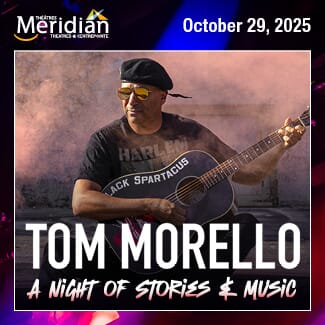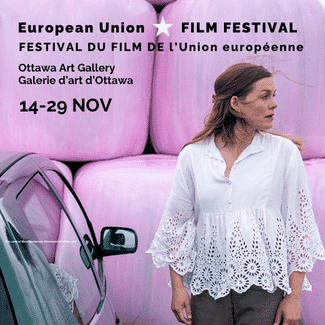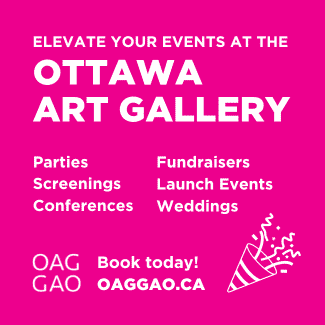Through a myriad of musical sounds, Cree Métis singer-songwriter iskwē | ᐃᐢᑫᐧᐤ (short for waseskwan iskwew, meaning “blue sky woman”) embarks on a journey of emotion and heartbreak. Her goal as an artist is to share her journey with others.
“Part of what I love about being on stage is inviting people into the world I live in,” she said. “It’s my goal to bring people into an environment where they feel comfortable and vulnerable.”
On Nov. 29, iskwē is bringing her stories to an intimate musical performance at the NAC’s Azrieli Studio.
“Truly, I just love performing,” she said. “Being on stage is my absolute favourite thing to do.”
iskwē has come a long way from her youth, when she performed in school musicals and auditioned for Canadian Idol. She now has an extensive catalogue of music that reflects on love, culture, and the experiences of Indigenous people in Canada. iskwē does not confine her music to a specific genre — instead, she prefers to give her audience the freedom to “make their own opinion” about her “mélange” of sounds.
“It’s got all kinds of bits and pieces,” she said. “Every time I release new music it’s different from the last stuff. I speak to the moments I’m living in.”
Her most recent single, “Part Two”, explores the aftermath of a teetering relationship through haunting electronic synths and thumping drum beats. “End Of It All”, released in September, offers a similarly open look into iskwē’s experience with love.
iskwē called her new music “the most vulnerable” she has ever been when sharing stories about relationships and heartbreak.
“The vulnerability of it is a necessity. I’m learning how to be more vulnerable with every project I’m working on,” she said.
Growing up, iskwē listened to her father’s “eclectic” music taste, which broadened her exposure to different kinds of melodies and sounds. She performed in city choirs and school musicals, then took voice lessons in her twenties to audition for Canadian Idol. iskwē called her audition “uneventful,” and she did not continue in the competition. But it was after that moment that she said to herself: “This is what I want to do forever.”
“There was no Internet and no way to think you could do something or have a career in music,” she said of growing up in Winnipeg during the 1980s. Since then, she has lived in multiple cities across Canada, as well as Los Angeles, New York, and Mexico City, where all of her recent music was recorded.
“It’s a part of my lifeline,” she said of living in different cities. “I don’t think I’d be an interesting artist if I didn’t move around and gather stories.”
Through her storytelling, iskwē invites her audience to join important conversations about social justice and human emotions.
“Art is an extension of my being and I try to make sure that I’m participating in conversations that are important,” she said. “When there’s things to speak up on, I use my platform and my voice to do it.”
iskwē reflects on the treatment of Indigenous people in Canada on her 2019 album, acākosīk, which includes the JUNO Award-winning song “Little Star”.
“If I’m having these difficult conversations, I want to make sure that people are feeling invited into the conversation in a good and safe way, and not that I’m just out here scolding people,” she said. “I want people to feel that they can be a part of the change they want to see in the world.”
iskwē added that she wants to keep having these discussions through art while finding ways to “make them beautiful” and “tap into humanity.” She recalled a recent performance where audience members approached her and expressed how emotional the show made them.
“It’s nice that they feel comfortable telling me that, and it’s nice that they feel comfortable just going there,” she said. “I want them to go to whatever emotional place they need.”
For her upcoming show in Ottawa, iskwē hopes to connect with the audience through an “intimate” production accompanied by a grand piano and cajon drum.
“It’s going to be very intimate and a way for us to get to know each other,” she said.
After her tour ends on Dec. 2 in Toronto, iskwē plans to release more music.
“I’m an artist,” she said. “Being able to just make art is very dreamy. It makes my heart and my soul feel good.”
iskwē will perform at the NAC’s Azrieli Studio on Nov. 29 at 8pm. EST. Tickets can be purchased here.
The NAC’s main accessible entrance is on Elgin Street. The Canal Lobby entrance and Parking 2 and 3 vestibules are also accessible. Seating for wheelchair users, the visually impaired and their companions is available in every performance venue. All NAC public spaces, event spaces, and washrooms are wheelchair accessible. Universal and companion care washrooms are located on the Orchestra level of Southam Hall.









